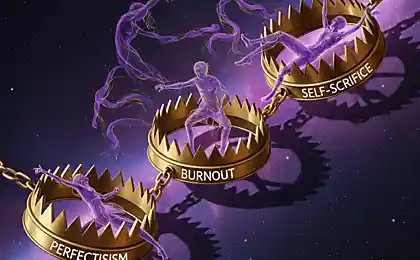256
Laziness – saving energy: why we are so critical to inaction

Who among us has not heard the popular phrase “laziness is the engine of progress”?
In reality, however, lazy people are often judged.
It seems that this is almost the main vice of the modern world, where dynamics are valued.
result and continuous growth. On the other hand, if you dig deeper,
Laziness can be not so much a negative quality, as a kind of “signal” about
The body and mind need to reset. Why do we give this natural state?
So many negative colors and how can you use laziness in your favor?

Why do we consider laziness "evil"?
Over the centuries, different religions and cultural attitudes have shaped the idea that
Idleness is the mother of all vices. As a result, society has learned to scold those who
Who doesn't show relentless activity. And when we fall into a state of passivity,
Instantly, we start to feel guilty: I don't do anything, I'm ineffective.
I miss opportunities.” In the twenty-first century, the concept of mental health
The fear of being “lazy” still persists.
Laziness as a signal of overload
But it is worth looking at this problem from the other side. Often laziness is nothing else.
It is a physiological and psychological mechanism that helps conserve energy.
When the body feels that we are on the verge of burnout,
It involves a “stop” mode, slowing down the pace of thoughts and desires.
So our body is saying, "You need rest."
Instead of judging yourself, it’s helpful to listen.
Have you exceeded your “limited load”?

Difference Between Laziness and Procrastination
Laziness is often confused with procrastination, the tendency to delay important things.
There are indeed intersections between them, but they are not the same thing.
When procrastinating, a person experiences inner anxiety, knows that he “should” do something.
But he can’t “go” from the spot. Laziness can occur without guilt:
There is no strength or desire to move forward. Laziness is often the result of physical and emotional fatigue.
Procrastination is associated with psychological barriers, such as fear of failure.
The Benefits of Reasonable Laziness
- Resource recovery.
Short periods of doing nothing help the brain reboot and increase creativity.
If you constantly "work for wear and tear", you can miss the moment.
When you just have to let yourself relax. - Creating healthy harmony.
Time for laziness is a kind of balance. A person who knows how to allow himself periodic "respite",
They are usually less likely to suffer from chronic fatigue and conflict at work or in the family. - Awareness of true goals.
When we give ourselves the opportunity to be lazy, there are moments for introspection:
Which projects are really important and which are imposed on us from the outside?

How to use laziness for good
- Set clear boundaries for rest.
If you decide to be lazy on Saturday, do it calmly.
without constantly reproaching yourself. Allow yourself to rest conditionally for 2 hours or all day,
but for real. - Learn to prioritize.
When we get laziness, maybe the body signals.
That we've taken on too much. Try to determine,
What matters can actually wait or be delegated? - Combine light physical activity with “lazy” rest.
Sometimes a simple walk in the fresh air or a little exercise
It will help to refresh the mind and relieve the feeling of lethargy. - Watch for anxiety.
If inactivity is accompanied by high levels of stress,
It is better to understand the causes of anxiety. Maybe it's not so much laziness.
How much in procrastination or fear of a particular task.
Laziness is not a sentence and not a “vice” that must be overcome by any means.
It's part of our human nature, the mechanisms of self-preservation and the signal of fatigue.
Of course, when laziness becomes chronic and becomes self-sabotage,
Think about motivation and goals. But in many cases, periodic "procrastination" and "laziness"
They allow us to slow down, re-prioritize and ultimately prevent burnout.
They can be a tool of self-regulation to help you stay in touch with yourself.
So instead of sternly blaming yourself and others for not being consistently productive,
Learn to find a balance between active activity and healthy relaxation.
After all, it is often in moments of peace that the brightest ideas are born and answers to important questions come.
Let laziness serve you as a wise counselor, reminding you that we are not robots.
People with limited energy resources.
And the more we take care of ourselves, the more we manage to do in the long run.
Огляд слота Aztec Gems Deluxe (Pragmatic Play)
What is dangerous thick bile and how to recognize it in yourself























